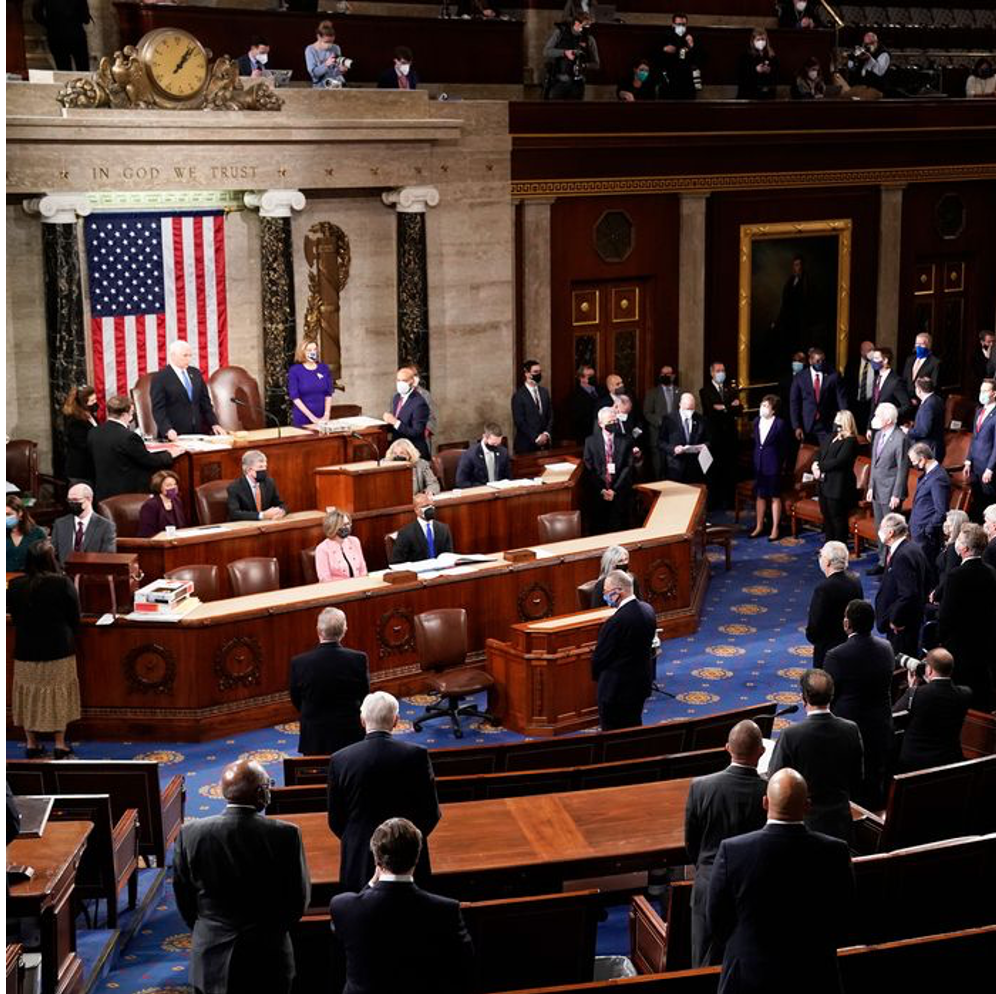
By Felicia Dusha, Staff Writer
In the wake of the January 6, 2021, attack on the capital, a bipartisan group of 16 senators is working to reform the Electoral Count Act (ECA)—an ambiguously phrased federal law which, according to lawmakers, threatens our democracy.[1]
Enacted by Congress in 1887 after the disputed 1876 Tilden v. Hayes presidential election,[2] the Electoral Count Act dictates the method of counting electoral votes following a presidential election. The ECA allows Congress to oversee the count of finalized state votes, while also allowing lawmakers to object to the results.[3]
According to Senator Susan Collins (R-Maine), one of the 16 senators leading efforts to reform the ECA, the 1887 law is “vaguely written in the inaccessible language of a different era.”[4] Although the ECA was intended to restrain Congress, in practice it has had the opposite and unintended effect of expanding the role of Congress and the vice president.[5] Collins points out that because of the restraint of the people counting the votes, despite its defects, the ECA was not an issue—that is, until the 2020 election.
Collins and other lawmakers contend that former President Donald Trump and his allies exploited the ambiguities of this archaic law and ignored the Constitution in an attempt to overturn the 2020 election. Trump argued that the ECA authorizes the vice president to overturn presidential election results. However, the ECA does not actually afford this power to the vice president.[6] The only role of Congress and the vice president, according to the Constitution, is to “open” and “count” the Electoral College ballots.[7] In the rare instance that states send competing slates of electoral ballots, Congress settles the dispute.[8]
But, because the law is not clear on the parameters of the vice president’s powers, Trump and his associates used the ECA to insist that they could still win the election.[9] As Slate reporter Mark Joseph Stern suggests, “[l]eaving this law unamended is like leaving a loaded gun on the table for Trump or any other future bad actor to pick up and use to disenfranchise millions of voters.”[10]
Writing for National Review, John McCormack reports that there are three areas of reform the legislation will likely address.[11] First, the legislation is expected to “clarify the role of the vice president who, as president of the Senate, presides over the joint session of Congress that counts electoral votes.”[12] According to Senator Collins, “the role of the vice president needs to be made crystal clear that it is ministerial.”[13]
Second, reforms of the ECA are expected to address the threshold for challenging the results of a state, which, according to lawmakers such as Collins, is far too low.[14] This reform would raise the threshold for making objections.[15] Currently, the law states that it takes just one senator and one House member to trigger a debate. As McCormack writes, “raising the threshold could help prevent frivolous challenges in the future.”[16] According to one proposal, for an objection to be heard, at least one-third of each chamber would be needed.[17]
The third, and as McCormack puts it, “the most important part of Electoral Count Act reform,” is the strengthening of guardrails to prevent a future constitutional crisis and to ensure a peaceful transfer of power to the legitimate winner of the presidential election.[18]
But lawmakers face significant issues in drafting reforms. Senator Collins told National Review: “The issues are more complicated than they might first appear. For example, what do you do if a governor refuses to submit a slate or submits a slate that does not reflect the popular vote in his or her state? Does that go to the state courts? Does it go to federal courts? Does it just go to Congress? It is one of the thornier questions, and I’m still researching it.”[19] Notably, this issue will make reaching consensus difficult.[20]
Columnist Ramesh Ponnuru of the Bloomberg Opinion examines such issues.[21] First, Ponnuru suggests that the proposal, which requires three-fifths vote of each chamber to sustain an objection, is unenforceable as “no Congress can bind a future one.”[22] When counting electoral votes, each Congress would have to agree to adhere to the terms of the ECA and “any supermajority requirements beyond those spelled out in the Constitution exist at the sufferance of majorities.”[23] Second, issues could arise where reforms deviate from the Constitution by attempting to stop misconduct by state governments through allowing federal courts to certify electors if state authorities will not.[24]
While supporters of ECA reform must resolve these issues, it is clear that the ECA should be amended, as its ambiguous and archaic language pose a threat to democracy.
[1] https://www.nytimes.com/2022/02/18/opinion/politics/susan-collins-eca-reform.html
[2] https://constitutioncenter.org/interactive-constitution/blog/looking-back-the-electoral-commission-of-1877
[3] https://www.npr.org/2022/01/14/1073025283/house-panel-issues-first-proposed-reforms-to-electoral-count-act-after-jan-6-att
[4] https://www.nytimes.com/2022/02/18/opinion/politics/susan-collins-eca-reform.html
[5] Id.
[6] https://www.wbur.org/onpoint/2022/02/07/protecting-democracy-or-political-distraction-looking-at-efforts-to-reform-the-electoral-count-act
[7] https://www.nationalreview.com/magazine/2022/03/07/what-reforming-the-electoral-count-act-can-do/#slide-1
[8] Id.
[9] https://www.wbur.org/onpoint/2022/02/07/protecting-democracy-or-political-distraction-looking-at-efforts-to-reform-the-electoral-count-act
[10] Id.
[11] https://www.nationalreview.com/magazine/2022/03/07/what-reforming-the-electoral-count-act-can-do/#slide-1
[12] Id.
[13] Id.
[14] https://www.nytimes.com/2022/02/18/opinion/politics/susan-collins-eca-reform.html
[15] https://www.nationalreview.com/magazine/2022/03/07/what-reforming-the-electoral-count-act-can-do/#slide-1
[16] Id.
[17] https://abcnews.go.com/Politics/electoral-count-act-present-problems/story?id=82396332
[18] https://www.nationalreview.com/magazine/2022/03/07/what-reforming-the-electoral-count-act-can-do/#slide-1
[19] Id.
[20] Id.
[21] https://www.bloomberg.com/opinion/articles/2022-02-17/congress-risks-overreach-in-reforming-electoral-count-act
[22] Id.
[23] Id.
[24] Id.